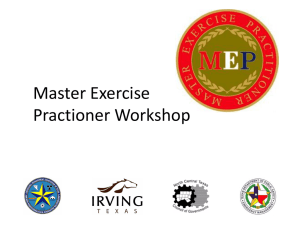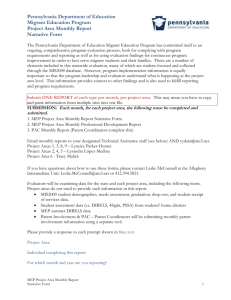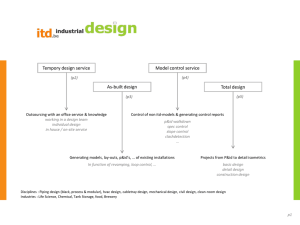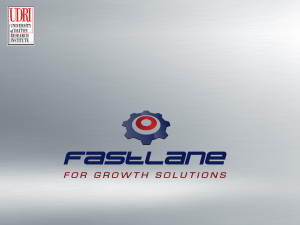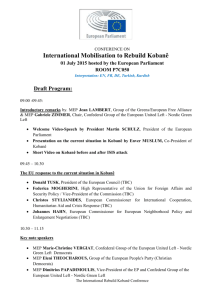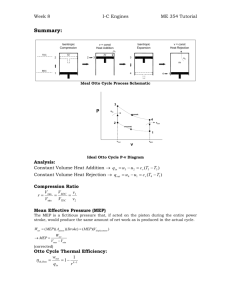QoC program 6 3 2012 definite
advertisement
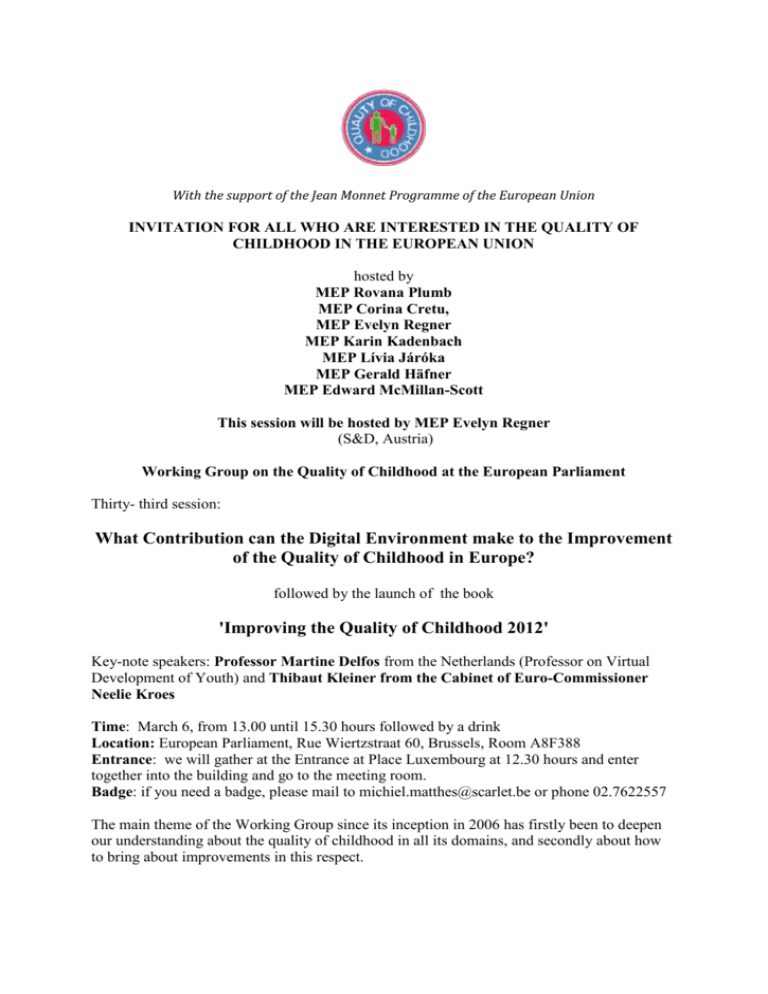
With the support of the Jean Monnet Programme of the European Union INVITATION FOR ALL WHO ARE INTERESTED IN THE QUALITY OF CHILDHOOD IN THE EUROPEAN UNION hosted by MEP Rovana Plumb MEP Corina Cretu, MEP Evelyn Regner MEP Karin Kadenbach MEP Lívia Járóka MEP Gerald Häfner MEP Edward McMillan-Scott This session will be hosted by MEP Evelyn Regner (S&D, Austria) Working Group on the Quality of Childhood at the European Parliament Thirty- third session: What Contribution can the Digital Environment make to the Improvement of the Quality of Childhood in Europe? followed by the launch of the book 'Improving the Quality of Childhood 2012' Key-note speakers: Professor Martine Delfos from the Netherlands (Professor on Virtual Development of Youth) and Thibaut Kleiner from the Cabinet of Euro-Commissioner Neelie Kroes Time: March 6, from 13.00 until 15.30 hours followed by a drink Location: European Parliament, Rue Wiertzstraat 60, Brussels, Room A8F388 Entrance: we will gather at the Entrance at Place Luxembourg at 12.30 hours and enter together into the building and go to the meeting room. Badge: if you need a badge, please mail to michiel.matthes@scarlet.be or phone 02.7622557 The main theme of the Working Group since its inception in 2006 has firstly been to deepen our understanding about the quality of childhood in all its domains, and secondly about how to bring about improvements in this respect. 2 Until a few decades ago the living environment of children and youngsters took place in three spheres: the environment at home the environment of daycare and the school the environment of the world outside But since the introduction of television, and later computers, mobile phones and the internet an entire new life sphere came into existence, namely the virtual environment. Therefore we depict today the Whole System of the Child as follows: A Diagram depicting the Whole System of the Child Age Category Home Environment Daycare and School Environment Work Environment Free time Environment Virtual Environment 22 and older 19-21 years old 16-18 years old 13-15 years old 7-12 years old 4-6 years old 0-3 years old Pregnancy Before pregnancy What happens in each compartment in the diagram above has an impact on the situation in other compartments, and with that on the entire system of the child. With this diagram we illustrate that the Virtual Environment of the Child is an integral part of the Whole System of the Child. In the session of 6 March we will focus on: What Contribution can the Virtual Environment make to the Improvement of the Quality of Childhood? To undertake this exercise in a systematic way we use as a framework for this session the analytical model, which is called the 'SWOT Analysis'. SWOT stands for the Strengths and Weaknesses of a particular organisation, which operates in a market, that offers to this organisation Opportunities and Threats. In our case we assume that the child and his family are 'the organisation', and that the Virtual Environment is 'the market' with Opportunities and Threats. With this model we can intellectually separate the child and his family from the Virtual Environment and explore the interaction between the two sets of variables. 3 The Strengths and Weaknesses of the Child in relation to the Virtual Environment The Strengths The digital literacy of the parents and the child Growing up in a child centred parenting environment with adequate education by the parents To be in a family that has a good policy regarding the purchase and the use of digital equipment To have sufficient resources Having strong social and emotional skills and good bonds with the family To be part of a good extended family with grandparents and uncles and aunts etc The Weaknesses The unawareness of parents and children of the threats of the virtual environment Lack of digital literacy of the parents and the children Digital Equipment is used to keep the children quiet. Insufficient education and supervision of the children Lack of structure in family life Not having digital equipment Being poor Having weak social and emotional skills and lack of bonds with the family Virtual Environment of the Child Opportunities The Virtual Environment can support all sorts of positive relationships of the child with family members, friends, grandparents, other members of clubs he/she participates in, school etc. There is rich and uplifting content in the Virtual Environment and many constructive contacts with known and also unknown people can be established and/or maintained. The Virtual Environment expands the child's knowledge and perspective on the world and facilitates the learning of foreign languages and contact with other cultures. The Virtual Environment facilitates the contact with other people nearby or far away. The Virtual Environment stimulates the technical skills of the children. Threats Decrease of the real life contact, which is predominant for genuine contact. Contact with less non-verbal information like eye contact Vulnerability to age-inappropriate content, such as violence, drugs, and sex, but also about the perspective on the world. The speed of knowledge proliferation is too quick to process, certainly for children who lack basic frameworks yet. Health threats, certainly with respect to gaming. Threat of addiction even in young adolescents. Threat of school drop out, especially boys. Vulnerability to become a victim of crime, such as pedophilia and human trafficking Vulnerability to become into contact with marginalized individuals, such as school shooters 4 Vulnerability to negative effects of excessive amount of screen hours (see Sigman, 2012) on cognitive development such as slow language acquisition; social development such as less social interaction and empathy; self-regulation such as overexcitedness, poor concentration, and sleeping problems; and unhealthy life style such as more sedentary lifestyle, poor eating habits, and obesity The SWOT Analysis used to identify Strategies for Children in relation to the Virtual Environment Virtual Environment in relation to the Child Weaknesses The Strengths and Weaknesses of the Child and his/her Family Strengths Threats This is the most vulnerable situation for children. Other stakeholders such as the school should help the child to make him/her aware of the threats in the Virtual Environment. Furthermore parents could be helped to strengthen their digital literacy. The authorities can play a role with age limits and filters etc. (art.17 Rights of the Child) In this situation the child has a good point of departure, but is confronted with a number of threats in the Virtual Environment. The parents and the school should play an active role to protect the child / make the child resilient visà-vis the threats in the Virtual Environment. School education should develop a way how to teach children to know what search machines can be trusted and when. How to process information with respect to speed and content. Opportunities In this situation the child's point of departure depends on the activity of other stakeholders such as the school which can help the child to benefit in an optimal way from the Virtual Environment. Furthermore parents could be helped to strengthen their digital literacy. In this situation the child is in the best position to benefit from the Virtual Environment 5 Overall objectives of these meetings: To gain a better understanding of the Quality of Childhood in the EU member states. This time we will focus on ' What Contribution can the Digital Environment make to the Improvement of the Quality of Childhood? To think about the role that the European Parliament and European Institutions could play to improve the situation among children. To get to grips with the principles and approaches that could lead to improvements for children’s well-being. To form an effective working group and to develop an awareness of how to move on. We take pleasure in inviting you for the 33rd session on 6 March 2012. We believe that we as members of the European Parliament working together with like-minded public interest advocacy groups and committed individuals can and should play an important role in this area. Yours sincerely, Rovana Plumb Corina Cretu Evelyn Regner Karin Kadenbach Lívia Járóka Gerald Häfner Edward McMillan-Scott Members of the European Parliament 6 Programme Outline for 6 March 2012 Time 13.00 13.05 14.25 14.40 15.00-15.05 Subject Opening What Contribution can the Digital Environment make to the Improvement of the Quality of Childhood? What Contribution can the Digital Environment make to the Improvement of the Quality of Childhood: The European Commission's Building Blocks for a Better Internet for Children Discussion Break Speaker / facilitator MEP Evelyn Regner Professor Martine Delfos Thibaut Kleiner, Member of the Cabinet of Euro Commissioner Neelie Kroes MEP Evelyn Regner Launch of the Book 'Improving the Quality of Childhood in Europe 2012' 15.05 15.15 Today's Childhood A Message from the Bernard van Leer Foundation 15.25 15.30 The QoC book is part of a process The Working Group on the Quality of Childhood, the viewpoint of a MEP Reception 15.35 - 16.00 Christopher Clouder Lisa Jordan, Executive Director of the Bernard van Leer Foundation (TBC) Michiel Matthes MEP Evelyn Regner Disclaimer: The organiser organises this session on a best effort basis. However changes in parts of the programme or in the entire programme may occur due to unforeseen circumstances and the organiser cannot be held liable for that. Secretariat for this session: Michiel Matthes Tel: +32.2.762 2557 E-mail: michiel.matthes@scarlet.be Internet: www.allianceforchildhood.eu 7 This programme was developed in cooperation with the Alliance for Childhood European Network Group, whose members are: ARGE-Erziehungsberatung, Austria The Linkedness Project, Belgium Experiential Education Project, Belgium Flemish Institute for Family Sciences, Belgium Saharan & North African Toy and Play Cultures, Belgium Denmark University of Jyväskylä, Finland Dr. Martina Leibovici Heidi Defever Professor Dr. Ferre Laevers Professor Dr. Hans van Crombrugge Dr. Jean-Pierre Rossie Claes Solborg Pedersen Professor, Emerita Dr. Lea Pulkkinen Le Furet, France Marie-Nicole Rubio Verein mit Kindern Wachsen, Germany Lienhard Valentin Sabine Heggemann European Foundation for the Care of Newborn Infants (EFCNI) Silke Mader Legambiente, Italy Vanessa Pallucchi Stichting Universele Opvoeding (NL) Marijke Sluijter Janusz Korczak International Society Theo Cappon Center for Youth and Development, The Hague University for Professional Education, The Hague Roosevelt Academy, Middelburg (NL) Professor Dr. René Diekstra Fundación Botín, Spain Fátima Sánchez Santiago International Association for Steiner / Waldorf Early Childhood Education (Sweden) Clara Aerts Family Lab International, Switzerland Jesper Juul European Council for Steiner Waldorf Education, Brussels Christopher Clouder Universal Education Foundation, Brussels Daniel Kropf The Educational Volunteers Foundation of Turkey Nurdan Sahin Mother Child Education Foundation, Turkey Batuhan Aydagül Secretariat of the Group, Brussels Michiel Matthes 8 This programme is organised with the support of the following organisations: The sessions held by the Working Group on the Quality of Childhood at the European Parliament in the period 2006-2012: 1. ‘The Toxic Childhood Syndrome and the Quality of Childhood’ with Christopher Clouder (UK) and Professor Hans van Crombrugge (Belgium). Host: MEP Karin Resetarits. 9 January 2. ‘Really Improving the Education in the European Union requires Systemic 2007 Changes’ with professor Luc Stevens (Netherlands) and Professor Ferre Laevers (Belgium). Host: MEP Karin Resetarits. 6 March 3. ‘The Quality of Child-Adult Relationships in Families and School’ with 2007 Jesper Juul (Denmark). Host: MEP Karin Resetarits. 15 May 2007 4. ‘The Child: his/her Networks and Neighbourhood’ with René Diekstra. Host: MEP Karin Resetarits. September 20 5. ‘How can we improve in the European Union the Early Childhood 2007 Educational Systems’ with John Bennett, the author of the OECD Study Starting Strong. Host: MEP Karin Resetarits. November 6 6. ‘How to let children and adolescents acquire key competences for the 2007 world of the 21st century? with Dr. Martina Leibovici-Mühlberger from Austria and Geseke Lundgren from Sweden. Host: MEP Karin Resetarits January 8, 7. ‘Attachment, what it is, why it is important and what we can do about it to 2008 help young children acquire a secure attachment? with Sir Richard Bowlby. Host: MEP Karin Resetarits. March 4, 8. ‘A vision on children and childhood in the European Union’ by Michiel 2008 Matthes. Host: MEP Karin Resetarits. May 14, 9. Professor René Diekstra about ‘The Changing Face of Adolescence. 2008 Accounting for changes in adolescent development and their effects on education and social policies’. Host: MEP Karin Resetarits. July 1, 2008 10. Professor Steen Hildebrandt (University of Aarhus, Denmark) about the 5 December 2006 9 September 16, 2008 November 12, 2008 November 17, 2008 January 27, 2009 March 3, 2009 April 28, 2009 September 8, 2009 November 17, 2009 December 8, 2009 January 12, 2010 March 2, 2010 April 13, 2010 June 8, 2010 ‘Multiple intelligences in the knowledge-based society’. Host: MEP Rovana Plumb. 11. Presentation of the report of the Fundación Marcelino Botín entitled ‘Social and Emotional Education, An International Analysis’ by Mr Christopher Clouder and Fátima Sánchez Santiago. Host: MEP Karin Resetarits. 12. Professor Boris Cyrulnik from France: what measures can we take to improve the quality of childhood in the European Union? Host: MEP Rovana Plumb. 13. Organisation of a Symposium in Bucharest, Romania at the request of MEP Mrs Rovana Plumb: ‘A European Policy Agenda for the Quality of Childhood with special emphasis on the case of the children of Romanian migrant workers’. 14. Professor Michel Vandenbroeck (University of Ghent, Belgium) about Diversity and Equity in Early Childhood Services. Host: MEP Karin Resetarits. 15. ‘Taking stock of what has been achieved with the Working Group since December 2006 and looking forward’ with Michiel Matthes, SecretaryGeneral of the Alliance for Childhood European Network. Host: MEP Karin Resetarits. 16. Professor Peter Moss (University of London) about young children and their services: developing a European approach. Host: MEP Rovana Plumb. 17. Continuing to work on improving the Quality of Childhood in the European Union during the present economic downturn with Professor Emeritus Richard Wilkinson, co-author of the book ‘The Spirit Level, Why More Equal Societies Almost Always do Better’. Host: MEP Rovana Plumb. 18. The Technical University of Dortmund won the tender issued by the European Commission to execute a Research Project to identify the key research questions regarding families and family policies. The leader of this project, Professor Dr. Uwe Uhlendorff gave a briefing on this Project and spoke about ‘Developing a European Research Agenda for Families and Family Policies’. Host: MEP Lívia Járóka. 19. Why Love Matters: How Affection Shapes a Baby's Brain, and the policy requirements in this respect with Sue Gerhardt, author of the book with the similar title. Host: MEP Evelyn Regner. 20. The PISA Study and lessons learned regarding the Quality of Childhood with Andreas Schleicher, Head of the Indicators and Analysis Division of the OECD Directorate for Education. Host: MEP Evelyn Regner. 21. ‘Improving the Quality of Childhood in the European Union: the Case of Roma Children' with Ivan Ivanov, Executive Director of the European Roma Information Office (ERIO) and Bernard Rorke, Director of the Roma Initiative Programs of the Open Society Institute (OSI). Host: MEP Gerald Häfner. 22. Improving the Quality of Childhood in the European Union: the Aspect of Parental Leave Policies by Professor Peter Moss of the Thomas Coram Research Unit, Institute of Education, University of London. Host: MEP Gerald Häfner. 23. ‘The City for the Children’. Key-note speaker: Vanessa Pallucchi, Director for Education of Legambiente, Rome, Italy. Host: MEP Vittorio Prodi and MEP Karin Kadenbach. 10 August 31, 2010 November 17, 2010 January 11, 2011 March 1, 2011 March 29, 2011 May 31, 2011 September 6, 2011 November 8, 2011 January 10, 2012 March 6, 2012 24. 'The impact of television and screen media on the Quality of Childhood and what are good policies in this respect on the level of the family, on the level of the country and on the EU level?' with Dr. Aric Sigman, author of the book 'Remotely controlled, how television is damaging our lives'. Host: MEP Karin Kadenbach. 25. ‘The proposed research agenda for the European Commission re families and family policies' with Professor Dr. Uwe Uhlendorff of the Technical University Dortmund, Germany. Host: MEP Mr Gerald Häfner 26. 'The Quality of the Physical Environment of the Child, the Current Problems in this area, and what needs to be done?' together with the Health and Environment Alliance and the INCHES Network. Host: MEP Gerald Häfner. 27. 'Educating the Art of Life: Resilience and Creativity in Contemporary Education' with David Brierley, Associate Professor at the Rudolf Steiner University College, Oslo Norway. Host: MEP Evelyn Regner. 28. 'A reflection on the European Commission's High Level Group on Literacy' with emeritus Professor Margaret Clark from the UK. Host: MEP Lambert van Nistelrooij. 29. 'Learning to move and moving to learn. Why physical development in the early years supports later learning, behaviour and achievement' with Sally Goddard Blythe, Director of The Institute for Neuro-Physiological Psychology in the UK. Hosted by MEP Edward McMillan-Scott. 30. Presentation of the report 'Learning for Well-being: a Policy Priority for Children and Youth in Europe, A Movement for Change' by Professor Ilona Kickbusch, Director of the Global Health Programme at the Graduate Institute of International Development Studies in Geneva. Host: MEP Karin Kadenbach. 31. Alcohol Nation, How to protect our children from today's drinking culture' with Dr. Aric Sigman. Host: MEP Gerald Häfner. 32. Presentation of a Proposal to set up a European Academy for Complementary Pedagogy by Jesper Juul. Host: MEP Judith Merkies. 33. ' What Contribution can the Digital Environment make to the Improvement of the Quality of Childhood? with Professor Martine Delfos from the Netherlands and Thibaut Kleiner of the Cabinet of Eurocommissioner Neelie Kroes. Host: MEP Evelyn Regner. Three books were published with the reports of these sessions: session 1-16: Improving the Quality of Childhood in the European Union: Current Perspectives. Volume 1 session 17-23: Improving the Quality of Childhood in Europe 2011, Volume 2. session 18-30: Improving the Quality of Childhood in Europe 2012, Volume 3. They can be ordered for €10 each, excluding postage, from Patrice Sullivan Patrice@ecswe.org or Chiara Carones ecswe2@gmail.com.


